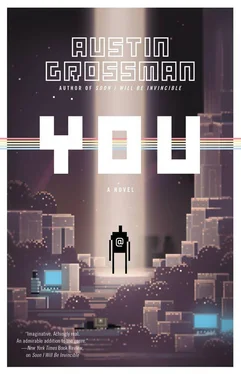There are always trade-offs, narrative paths not taken. Nick finished with a little less money. He missed a bulletin from America he was meant to pick up that night.
And one night in June, you lay in wait on the Île de la Cité for the operation’s mysterious ringleader. You were now a trained British intelligence agent, which means that you had spent a weekend in the country with a white-haired old eccentric who taught you to operate a radio, read a surveyor’s map, and fire an antique Webley ineffectually at a target across a lawn (“Just keep practicing, laddie”).
The evening jacket, which in March you once hugged tight around you against the chill, is now uncomfortably hot. March was so long ago, long days and nights of dances and laughter and so many, many glasses of Champagne. You would barely recognize the man who rang in the New Year walking alone along the Quai de Montebello, shivering, glaring spitefully up at the lighted windows and the laughter trickling down, flinching at the sight of lovers by the Seine. For four months now you lived the life of your dreams.
You heard a voice in the fog say, “Gently, gently now! Or Karoly will murder the lot of us,” and the sound of a small boat bumping against the stone landing, and then a rapid exchange in German.
You rushed forward in time to see a long and narrow package being handed down to two men in a waiting speedboat by a third on the dock. The man on shore straightened up to meet you. His scarred, mustachioed face was the one you expected. It was Lord Mortimer himself, Laura’s father, alias Karoly, alias (duh) Lorac himself, in his twentieth-century incarnation. “Sorry, my boy, it’s finished,” he said, and drew a revolver from his satin-lined greatcoat.
If you’d kept your pistol you might have tried to shoot him. Years ago, you did. But this time, he fired, and stepped lightly into the boat while you sank to your knees in the dark, cursing.
He would live on, together with his now-crucial inventory. But whatever choice you made, the first Clandestine game ended with Nick watching Laura disappear into the pixelated fog of the Gare du Nord. The Clandestine theme played again over a montage of scanned photographs from the Nazi occupation of Paris, now only three years away.
When I last played it, that ending seemed at the time like the height of sad sophistication, the confirmation of all my darkest, most dramatically adolescent ideas of myself and the nature of love.
I saw less and less of Simon that year. I wish I could say I tried harder, but it made me uncomfortable. It was a time in my life when I was trying to join the prelaw fraternity and convince myself I was going to be the kind of virile corporate lawyer who appears in thriller novels, who plays rugby and can fly a small plane and might someday run for Congress.
And then, Simon was a more and more marginal-looking character. He was living in a shabby group house in Amherst, inhabited by maybe a floating third of the CS department. I was there once, stopping in before we went out to dinner. It seemed furnished entirely with beanbag chairs and carpet fragments; they’d broken open the drywall to expose the first-floor wiring. They had three different generations of game console in the living room, and there was a commotion upstairs that I guessed to be an improvised sport involving an ottoman, a Wiffle ball, and approximately three to five grown adults. It seemed at the time like all of Simon’s friends, men and women, played ultimate Frisbee and dressed like the nerd auxiliary of a biker gang. Not only could they field-strip a hard drive but they also carried the necessary tools in their pockets. They juggled when I didn’t want them to, and were opinionated about manned space exploration, and seemed to be building a medieval siege weapon in the back yard. And it didn’t help that Simon seemed happy; annoyingly, he seemed almost cool. He told me stories about outwitting campus security, and parties where they did weird things with dry ice. He even had a girlfriend for a year, who, judging by the little contact I had with her, was an unbelievably nice person. Whereas I constantly felt like I was auditioning for my grown-up life. In fact, I felt like a bit of a schmuck.
Six weeks after Clandestine was released, Simon woke under the conference-room table to Darren shaking him.
“I got a call from EA. They tracked us down. They want to publish us. They want to buy Clandestine .”
The conversation that followed was long only because it was so hard to agree on a company name. Blast Radius, AwesomeStrike, and Quantum Pony were considered. Quarterstaff. Primeworld Optimization Services. Panjandrum. Hyperdream. Nekropony. Dimension Door. Cybermantix. Monumental Games. Rat Giant. Fire Giant. Storm Giant. Wizard Panic. Black Arts.
They’d need another new graphics engine and a whole new approach. The industry was pivoting away from graphic adventure games. The Legend of Zelda: A Link to the Past came out, Civilization came out, and Street Fighter II, and Sonic the Hedgehog . Parallax scrolling was ancient history compared to what was coming. The technology was progressing almost faster than they could keep track of it. The only question was what to do with it.
Black Arts got itself a real office, a sunny penthouse loft that could have fit the company three times over, with a wraparound view of downtown Boston, free snacks, a private game arcade, and a life-size plastic sculpture of Brennan. Darren bought the Rolls; Simon probably bought some new T-shirts. Darren roamed the office with a BB gun, stopping to sight down the hall at shelves full of Game of the Year trophies. At the end of the day, the cleaning staff swept up the BBs and put them in an urn for the following day.
Can I talk to you for a minute, Russell?” Lisa was standing behind me. I wondered how long she’d been there.
“Sure.”
“Privately, I mean.”
“Okay,” I said. Private talks weren’t part of Black Arts’s open-office design, so when anybody wanted to chat confidentially it meant walking all the way to the End of the World. Black Arts wasn’t anywhere near large enough to fill the space we occupied, so half the office was just a trackless desert of blue carpet. We checked to make sure nobody was trying to sleep in any of the unused cubicles nearby.
“So what’s up?” I asked. There was no place to sit, so we both just leaned against the wall.
“So I’ve been thinking. Let’s say I knew more about Mournblade than other people. Would it be okay to talk to you about it?” She wasn’t looking at me, just back toward where the working area was. At this distance it glowed like a city on the horizon.
“You mean, would I tell anyone else?”
“Yes.”
“No, I wouldn’t,” I said. I hadn’t thought about it ahead of time, but it was true. “I would feel bad keeping secrets from Don, though.”
“Let’s say sooner or later I’ll end up telling Don.”
“Okay. Agreed.”
“Okay. So we can’t get Mournblade out of the object database because that’s not where it is, right?” she said.
“According to you.”
“Right. But it is… someplace in the world. The code that generates it also puts it into the world. There’s a room where it exists.”
“Then why can’t we find it on the map?”
“Because the engine generates that room, the same way it generates the object,” she said. Dealing with people who knew astronomically less about a subject than she did was just ordinary conversation for her. “It builds the space when the game is running. This is why WAFFLE is such a weird program. It generates data procedurally, the same way Mournblade comes into being. WAFFLE can make things up; that’s what makes it so interesting to play.”
Читать дальше





![Ally Carter - [Gallagher Girls 01] I'd Tell You I Love You But Then I'd Have to Kill You](/books/262179/ally-carter-gallagher-girls-01-i-d-tell-you-i-lo-thumb.webp)






